The global online gambling market is huge!
You've seen the data: According to Statista, its current size oscillates around $97 billion, and research by Spherical Insights & Consulting suggests it might grow $164.5 billion by 2033. Statista estimates that revenue in the online casino market should reach $35 billion.
As everybody wants a share of the pie, the competition is high. This is made worse by the massive budgets casinos and gambling throw at marketing, and this includes link-building.
However, this is only one reason this is one of the most challenging niches for link-builders.
What are the others?
You will learn this from the article. I will also show you common trends and strategies in casino link-building and share ideas on where you can get these links.
What Is Casino Link Building?
Casino link building is the process of securing inbound links from other websites.
Here's an example of such a link in an article about James Bond published by Attitude, an online pop culture magazine.

This isn't different from other industries: Backlinks signal to search engines that the casino is authoritative and trustworthy. This improves its performance in SERPs, translating into higher traffic that converts into player deposits.
However, link builders in this niche face challenges that may not be an issue in other verticals.
Why Is Link Building for Casinos So Hard?
PPLC. Porn, Pills, Loans, and Casinos. Four of the most challenging link-building niches.
Why are they so difficult?
Here are the top 5 five reasons.
1. Intense competition
As mentioned, there's a lot of money to be made from online gambling.
There were over five thousand online casinos and gambling sites registered in the world in 2024, and this doesn't include affiliate sites.
Each wants a share of the market, making the competition rather fierce.
2. Huge budgets
As gambling sites make a lot of dosh, they also can commit big budgets to marketing.
To effectively compete for these links, you need to be ready to pay the top dollar for backlinks.
Just to give you an idea:
If you're in the SaaS industry, an SEO and link-building budget of $10–15k per month can get you to the top spots in Google. However, in the gambling niche, you're looking at $40–50k per month to get similar results.
3. Strict laws and regulations on gambling advertising
In many countries, there are strict rules and restrictions on marketing and advertising casinos and gambling services.
Most EU countries, like Belgium, Italy, or Lithuania, have a complete ban on gambling advertising or restrict it heavily, for example, to nighttime, like Germany. In the US, there are state-specific laws that regulate how you advertise these services, and in Australia, offshore companies are banned from advertising their services in the country.
This further complicates link-building efforts. For example, buying sponsored articles featuring links in a national paper isn't an option in many places.
4. Many sites refuse to link to gambling content
Many website owners refuse to provide links to gambling and casino sites, which limits the number of opportunities.
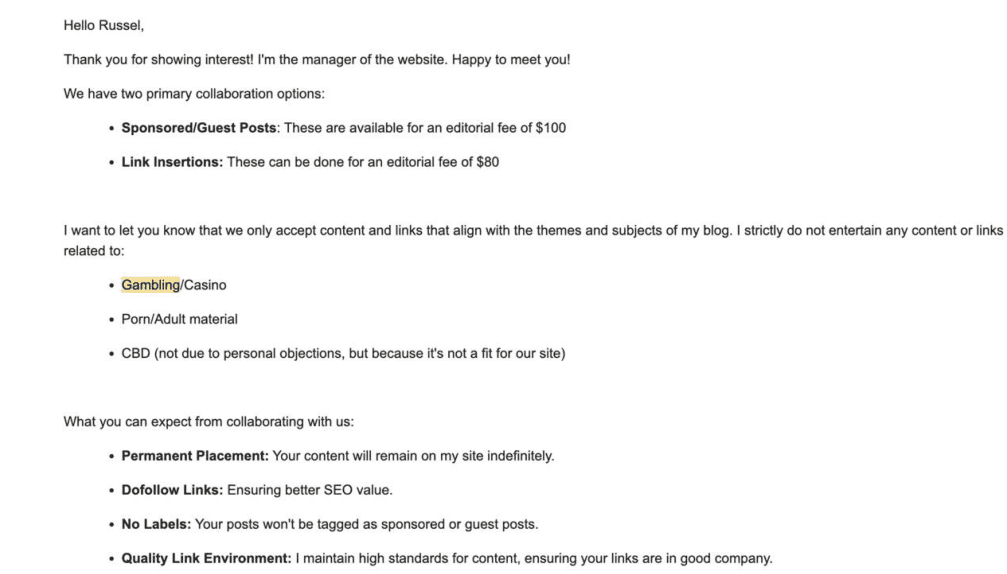
Why?
Essentially, people generally consider promoting gambling unethical because of the impact it has on people's lives. It's estimated that 1.3 million Britons have a gambling problem, and there could be as many as 496 gambling-related suicides a year in the country.
It isn't really surprising that webmasters don't want to have anything to do with such an industry.
Gambling, drugs, adult content, and loans are also associated with link spam, and websites are afraid that linking to such sites can hurt their rankings. And their reputation.
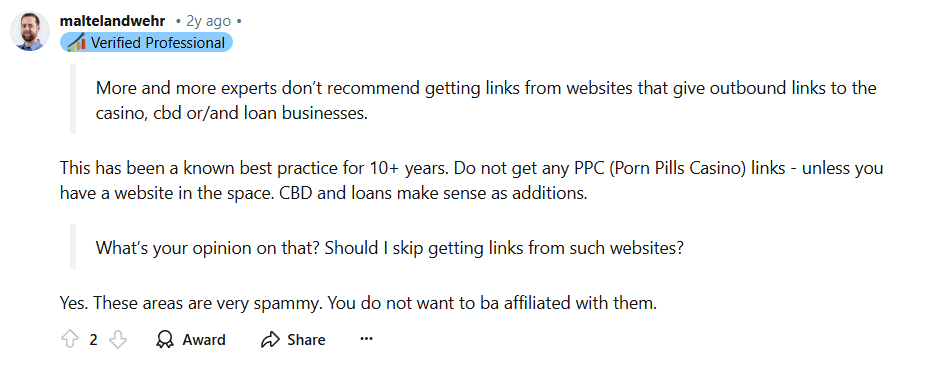
5. The need for gray- and black-hat tactics
Given the legal restrictions and the limited number of websites willing to link to gambling content, link-building via white-hat methods is simply unrealistic.
That's why link-builders in this sector resort to tactics that violate search engine guidelines and sometimes break the law outright.

Common Tactics Used to Get Gambling and Casino Links
Here are some of the tactics that casinos and gambling sites use to secure backlinks.
✅ Parasite SEO link building
Parasite SEO is when you place your content on a high-authority website with a powerful link profile to boost your search engine rankings.
One way to do it is by purchasing paid placements from reputable media outlets.
Here's an example of a sponsored placement in the Sun, a British tabloid with DR90.
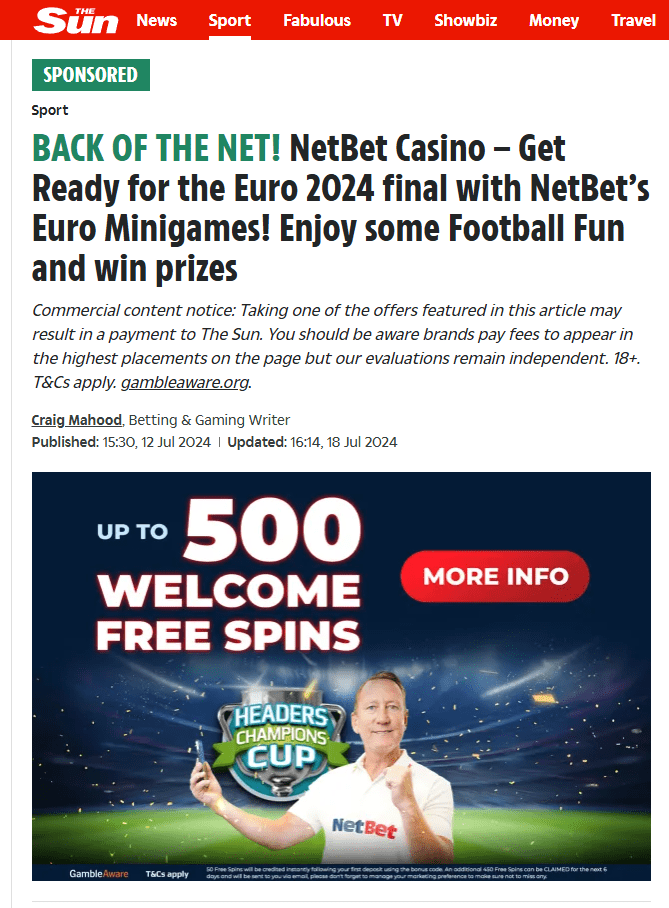
With prices ranging from $50 to 70k a year, this isn't a cheap way to advertise your service. However, when you look at the referral traffic value this article brings in, it doesn't seem such an exorbitant amount.
Another way to get a ride from high-DR websites is through affiliate programs.
Here's how it works in a nutshell:
Newspapers or magazines often allow 3rd party companies to publish content that looks as if it was written by their own writers. These often include reviews of products, companies, and services that aren't directly linked to their topics. Think software, financial products, and home appliances. Or casinos.
The articles include affiliate links, so the outlet gets a cut while the casino benefits from the website authority and its referral traffic.
For example, if you search for "best online casinos in the UK," you'll find this article in The Independent (DR91) in the #2 spot.
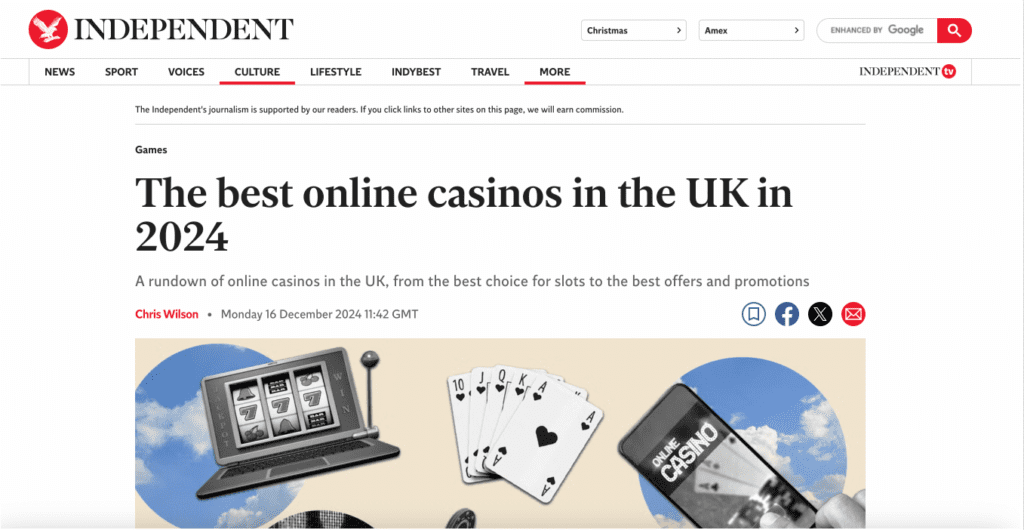
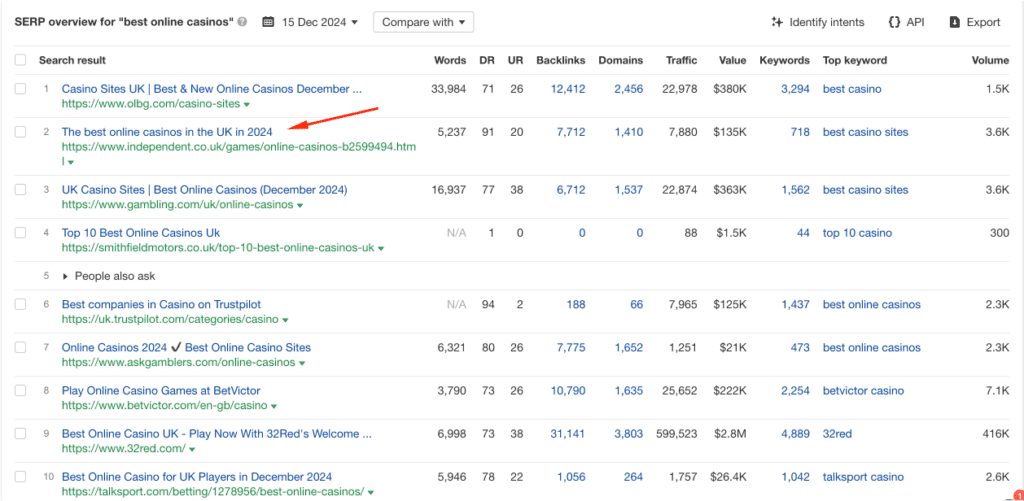
While this has been a popular tactic for a while, it looks like we might see its end pretty soon.
Google has been cracking down on such site reputation abuse practices, and the recent penalty issued to Forbes Advisor is the perfect example. Previously, big publishers like CNN or USA Today got slapped with penalties for their coupon directories.
If more publishers get burnt like that, they will be very cautious about what they publish.
✅ PBN backlinks
PBNs are networks of private sites created with one purpose in mind: to provide backlinks.
Instead of prospecting, reaching out to website owners, negotiating placements, and creating content, you build your own network of sites (or buy an existing one) and place links on them to your website to boost its performance.
In niches where opportunities to secure legitimate backlinks are limited and competition is high, like in gambling, PBN link-building is rife.
Here's an example of PBN links pointing to a big online casino. All the websites have the same IP address, were added in November 2024, have several hundred referring domains, and yet hardly any traffic. Another telltale sign they're link spam schemes is the unnaturally high outbound-to-inbound link ratio.

✅ Guest posting
Guest posting is when you create content for the host website. In addition to securing a backlink, guest posts increase your brand visibility online and allow you to reach audiences that would otherwise not know about your service or product.
You can find these opportunities through Google Search using advanced operators. For example, I found this guest posting opportunity at Billionaire Gambler by searching for gambling "write for us"
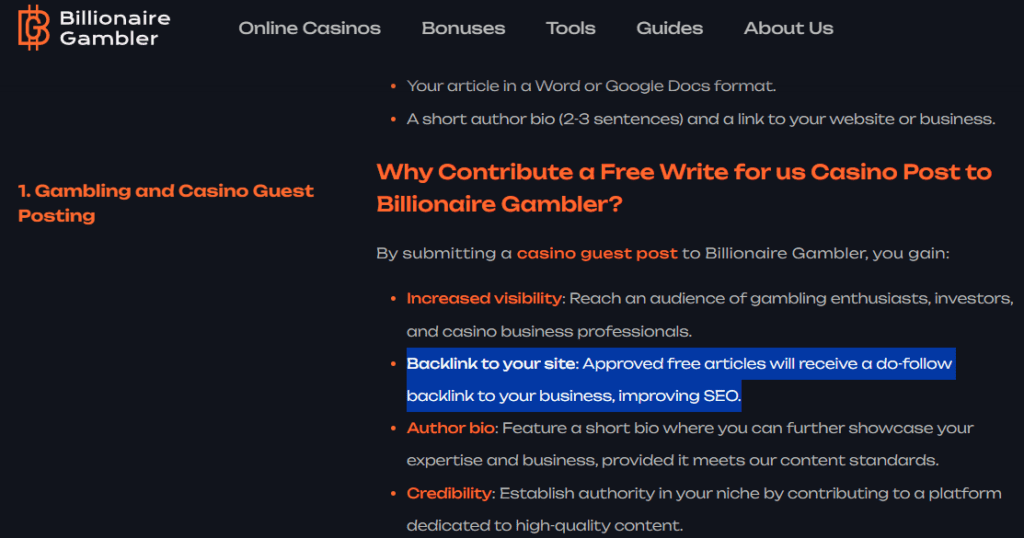
This particular website doesn't charge anything for guest posts if they meet their editorial criteria.
However, this isn't the norm. Website owners know how much such a link could be worth for your business, and they charge premium prices. Expect to pay $500-600 for the opportunity.
✅ Editorial links
Editorial links are links inserted by the writer or editor to enhance the article's value.
Here's an example of such an insertion into a New York Post article (DR91). It links to a blog post on an online casino website where readers can find out more about edge sorting.

This link is relevant and adds value to the content, so it doesn't appear to violate Google's guidelines.
But here's the kicker:
The article was published in 2016, but Ahrefs first crawled only in 2020.

This suggests the link wasn't inserted organically by the writer or editor at the publishing stage. Instead, some link-building action was involved.
Such link insertions work like a dream for SEO because the page already ranks, has inbound links, and benefits from a strong domain profile.
✅ PR link building
If you want to build high-quality backlinks from major media outlets like the ones above, digital PR is the way to go.
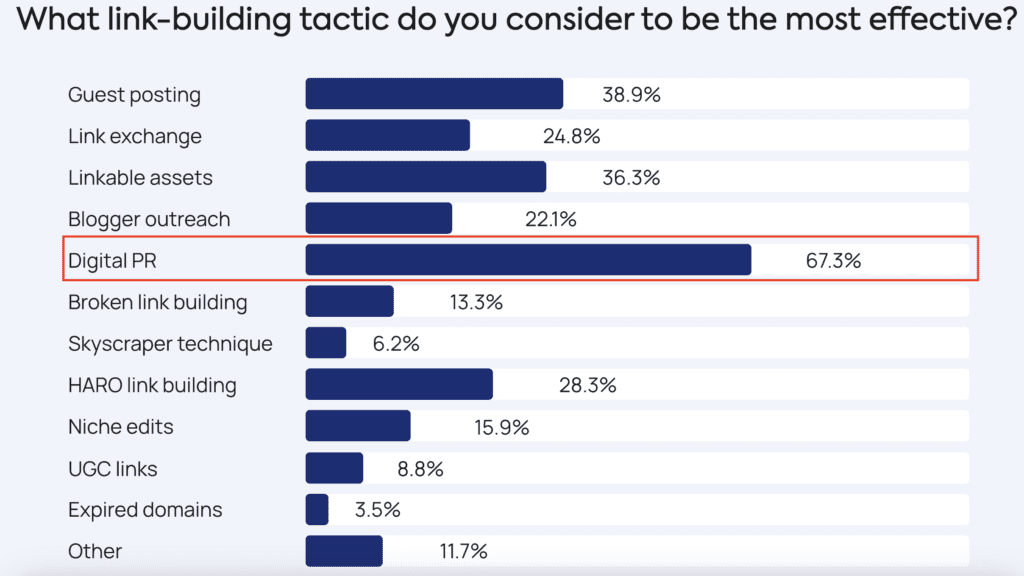
Its main benefit? A single campaign can fetch a few such links, and even if they're nofollow links, they give the business tons of exposure.
The best part? These links are 100% earned, not paid for.
Sure, a single campaign can set you back $5-10k, but that's nothing compared to 50k for a single article in a national paper.
So, it's no surprise that casinos and gambling sites invest in them.
The most common campaigns in the niche use newsjacking and reactive PR. That's when you pick up a trending topic, create a story that tackles it from a unique angle, and pitch it to journalists who cover the topic.
For example, this PR agency secured several links for a sports betting website with stories covering the reality show Love Island and the Super Bowl.
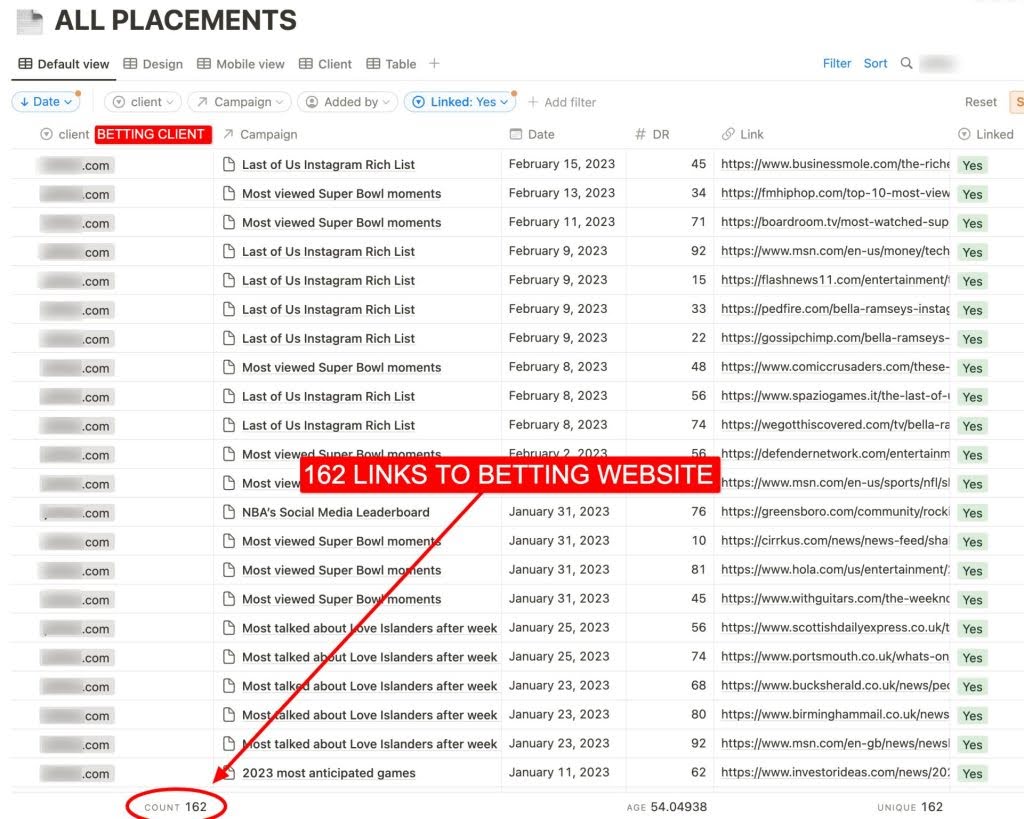
Other types of campaigns, like product PR or thought leadership, are less popular in the gambling space.
✅ Influencer link building
Collaboration with established bloggers and influencers in your niche is another way to secure gambling links.
Here's an article written by Ray Parlour, a former British footballer and football pundit, for Mail Online (DR91).
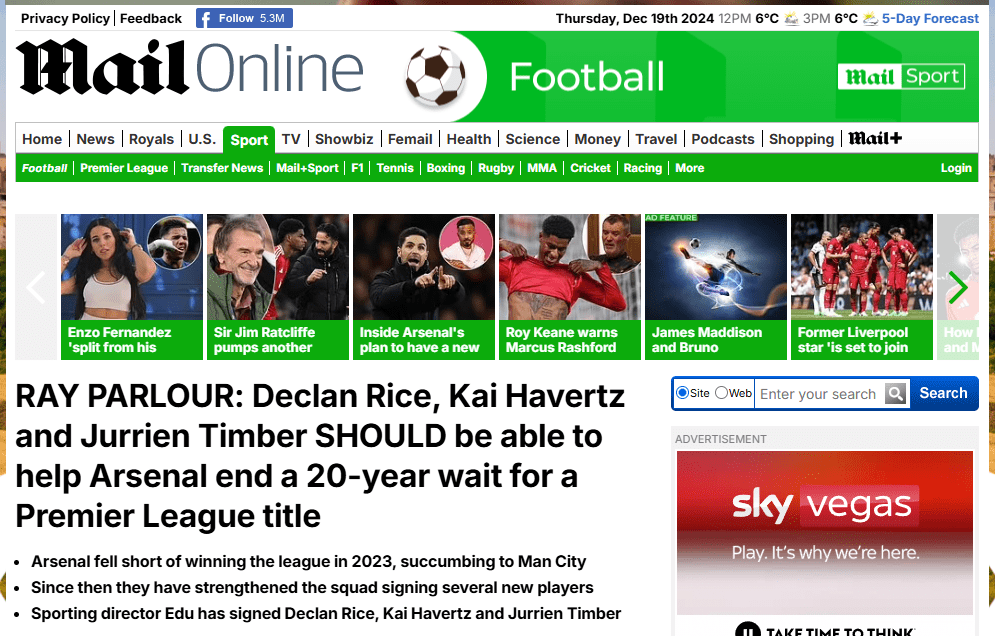
Ray Parlour is an ambassador for an online casino, and all of his articles feature a backlink to the casino's website.

✅ Expired domains and 301 redirects
Another way to secure casino backlinks is by purchasing expired domains.
Last year, we studied what happened to 9.3k expired domains for sale, and more than a quarter of them were purchased by online casinos.
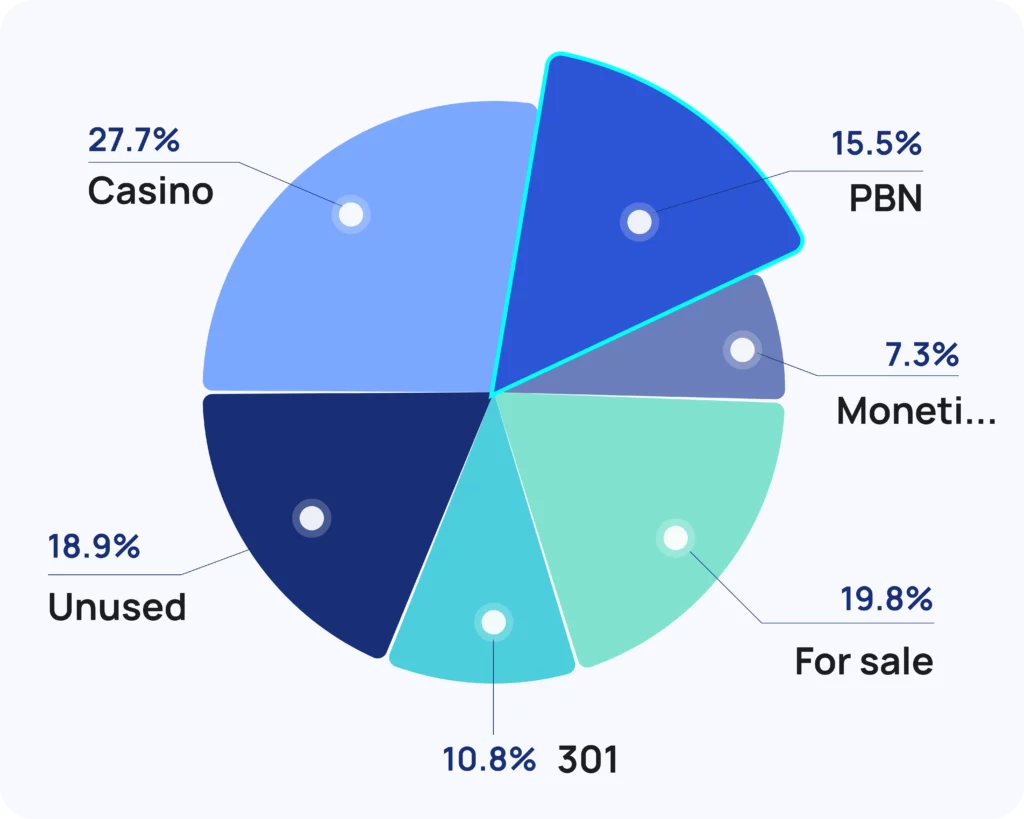
An expired domain with a strong backlink profile is quite expensive ($$-$$k), but it's still cheaper than building all these links from scratch.
Once you purchase the domain, there are two ways to leverage it for link-building.
- Use the domain to build a PBN: You rebuild the site and link it to your home page.
- Set up a 301 redirect to drive all the traffic and PageRank to your website.
✅ Tiered link building
Tiered link-building is when you build layers (tiers) of links to support a particular page.
For example, you get a top-tier editorial link in an online magazine that brings a fair bit of referral traffic and pumps link juice.
It's in your interest for this article to do well, so you build links to it. These tend to be cheaper and lower-quality backlinks, for example, from resource pages or personal blogs. That's tier 2.
It doesn't stop there. To promote the content in tier 2, you build a further layer of links, for example, on social media and forums.
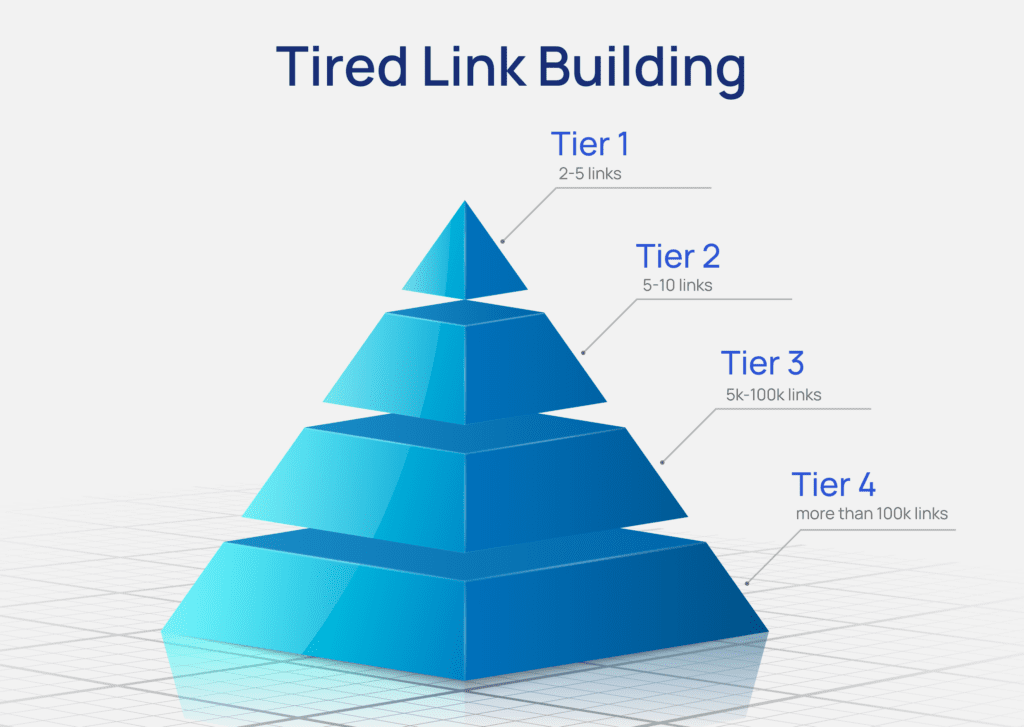
Why is tiered-link building so popular in gambling link-building?
As I said, there aren't too many pages that are willing to link to casinos, and these links are expensive. So it's easier and cheaper to build a handful of quality backlinks and prop them up with lower-quality ones.
Moreover, it reduces the risk because it's easier to cut off the nodes that get hit by penalties if they don't link directly to your money site.
Paradoxically, this link-building strategy is also a reason why many webmasters don't want to include casino links. They are afraid they will get lots of spam links that will weaken their backlink profile and make them vulnerable to penalties.
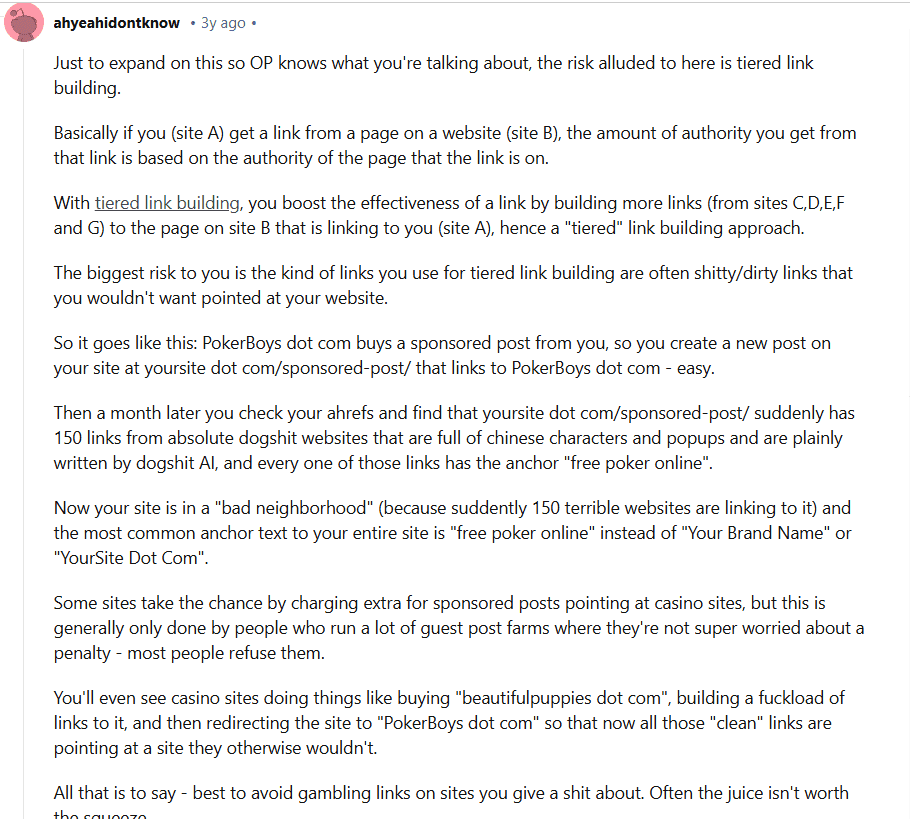
✅ Aggressive anchor text
SEOs building links for casino, gambling, or sports betting sites don't shy away from keyword-rich anchor texts.
While there's nothing wrong with such anchor text when they're contextually relevant, they aren't very often.
Compare these two. In the first one, the anchor text is relevant. It doesn't feel like it's been forced into this article.

This one, on the other hand, is squeezed into an article that's completely unrelated to the niche. There's no mention of casinos or gambling in the text. It isn't even in the main text body but at the bottom, along with other similar spammy links.
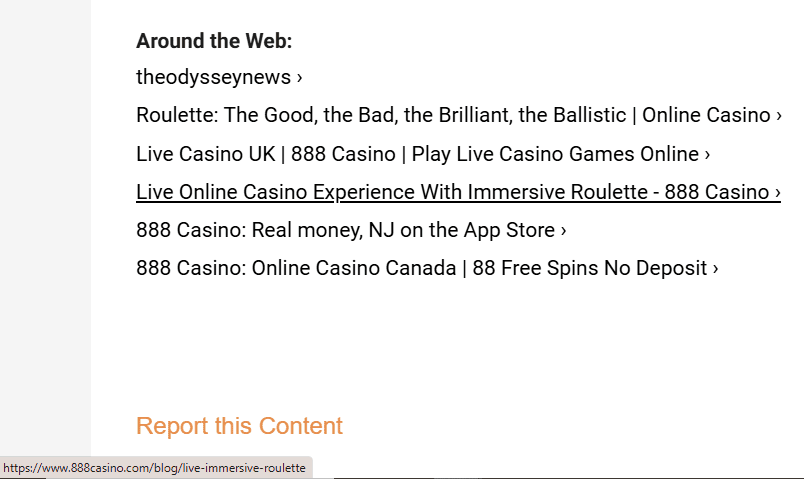
✅ Domain hacking
Some of the tactics link-builders use in the gambling space don't just violate search engine guidelines. They are illegal.
Take hacking as an example.
Unethical SEOs hack into a website and insert links, often hidden ones, to avoid detection without the owner's permission.
A less invasive way to do it is by inserting backlinks into WordPress themes, plugins, or templates.
While it's possible to protect your website against such practices, many owners aren't aware of the risk and get their domains exploited.

Where Can I Land Relevant Links in a Casino Niche?
Your first port of call should be websites directly linked to the gambling and casino industry. Think game blogs, strategy sites, poker websites, or sports betting blogs.
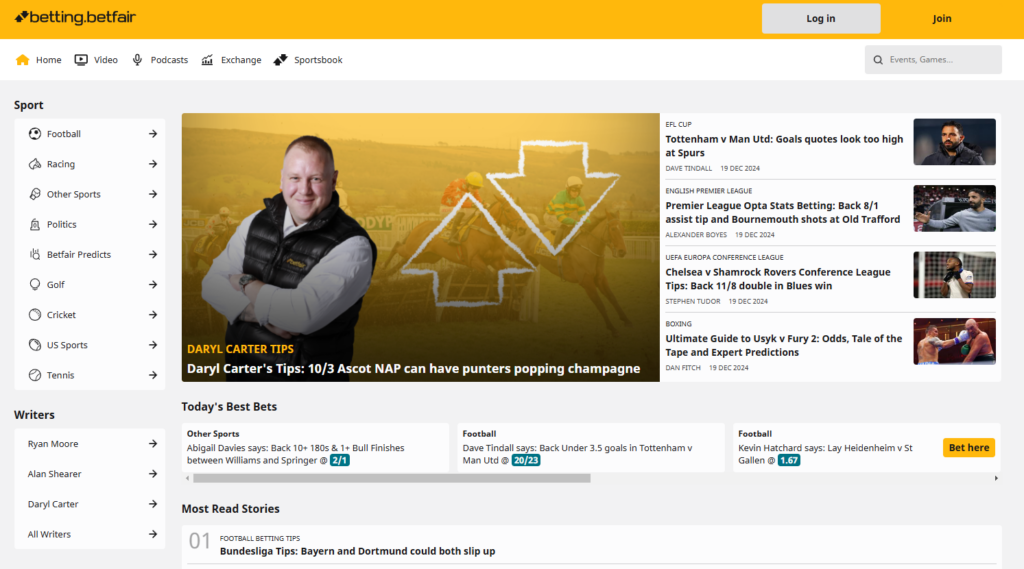
However, you won't go far if you only limit yourself to purely gambling sites. There aren't enough of them.
So, consider shoulder niches like:
- Gaming (video games, card games, etc.)
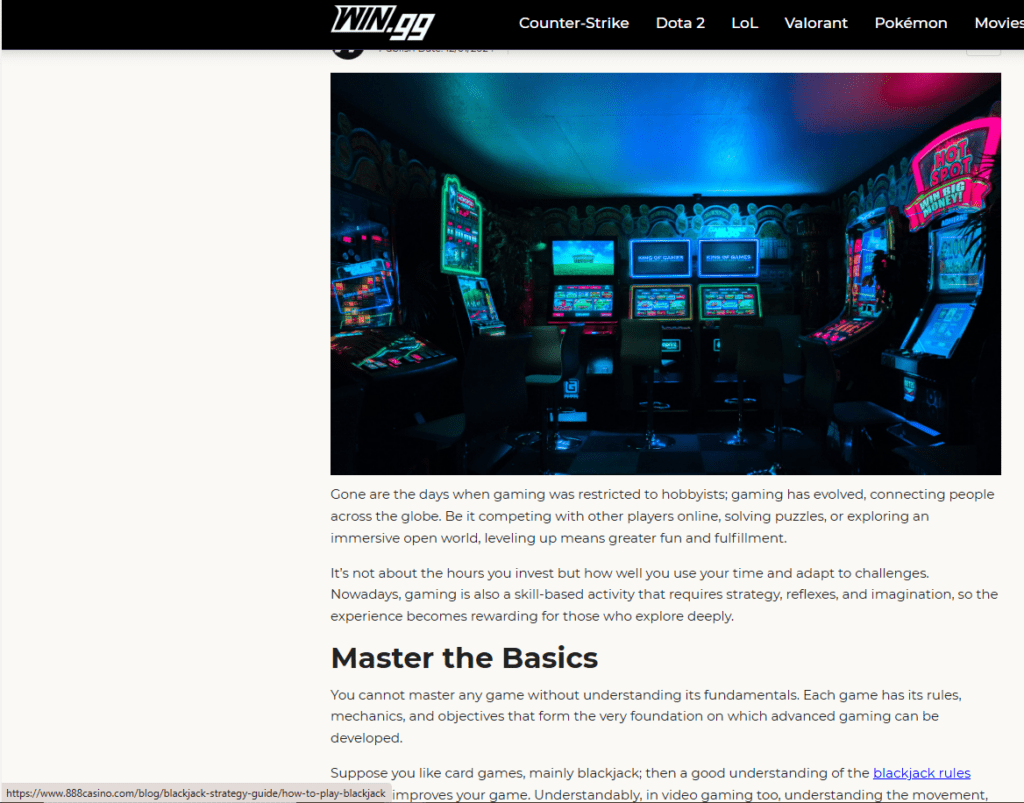
- Lifestyle and leisure (entertainment, travel, comics, hobbies, movies, celebrity gossip).
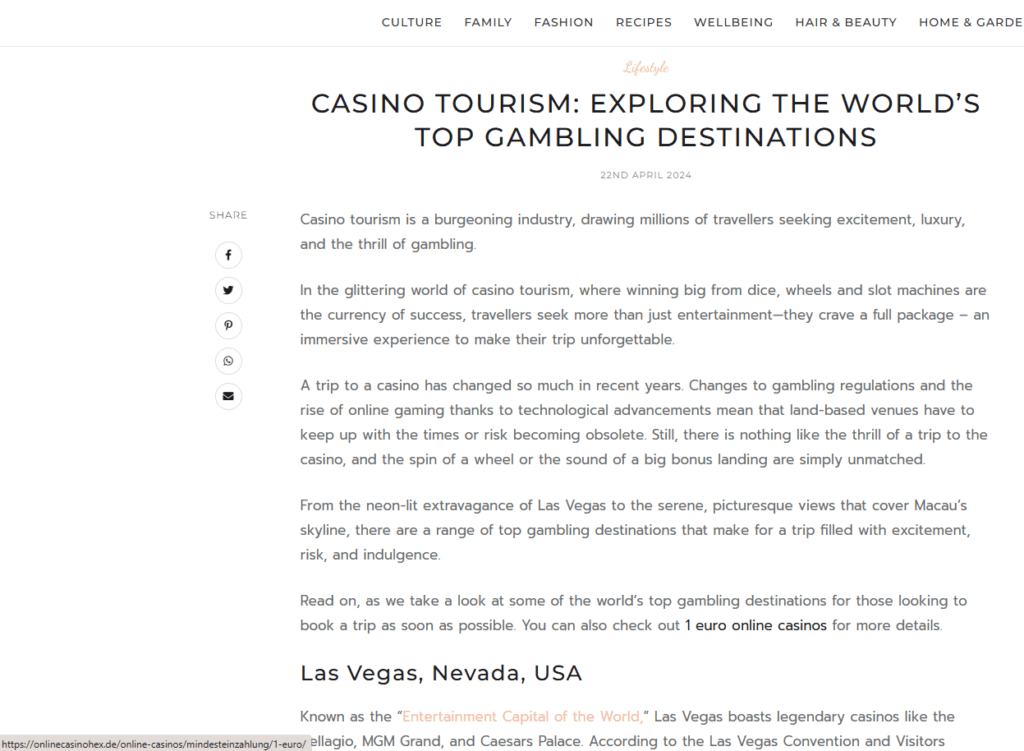
- Sports (UK sports is a good niche because of relaxed advertising laws and wide exposure).
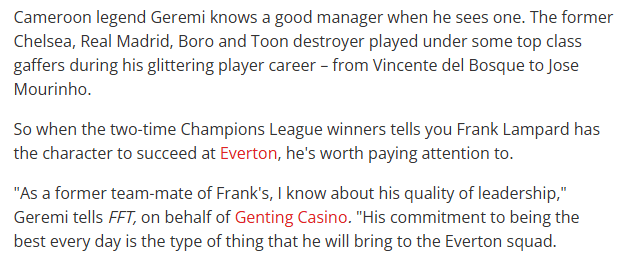
- Business (Finance, wealth management, careers, cryptocurrency)
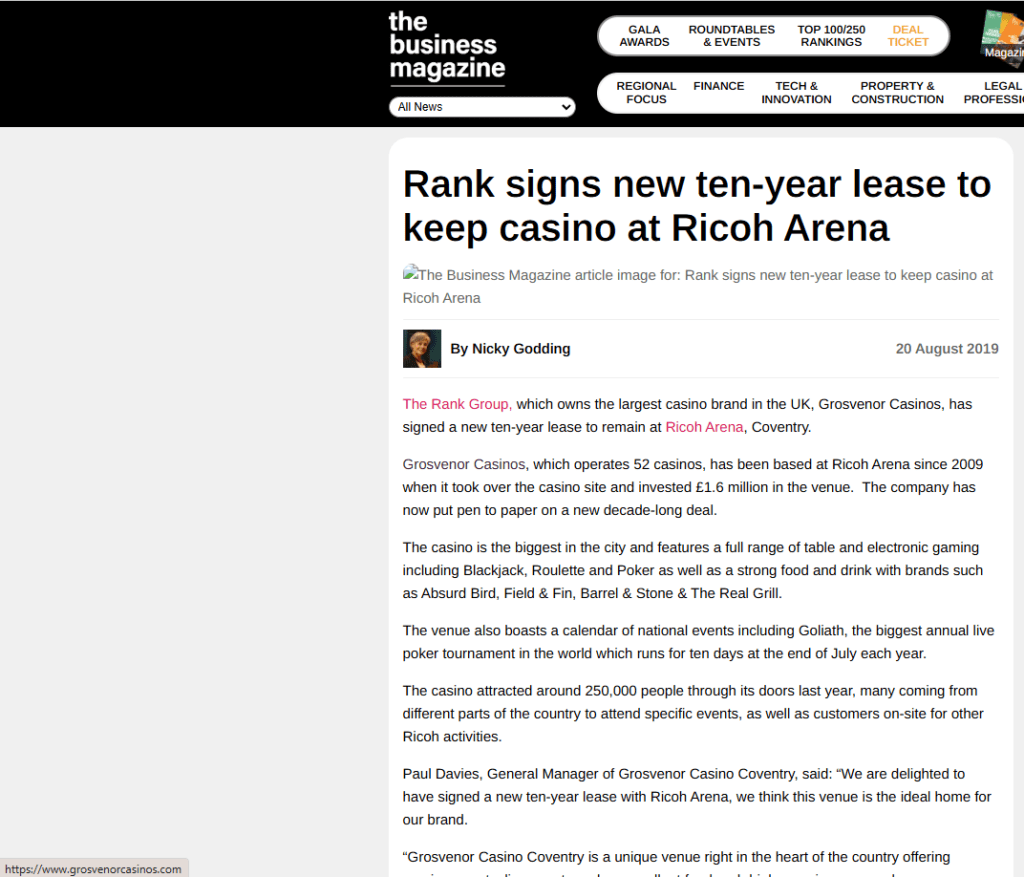
- Technology (Mobile and app blogs, computers, general tech, VR).
Best Casino Backlink Providers for 2025
For quality casino backlinks, these two are among the few that actually deliver.
1. INSERT.LINK
INSERT.LINK makes link placement simple. You don’t need to do outreach or wait around. Just browse real indexed pages that are ready to host your links. It works like a custom search engine for backlinks.
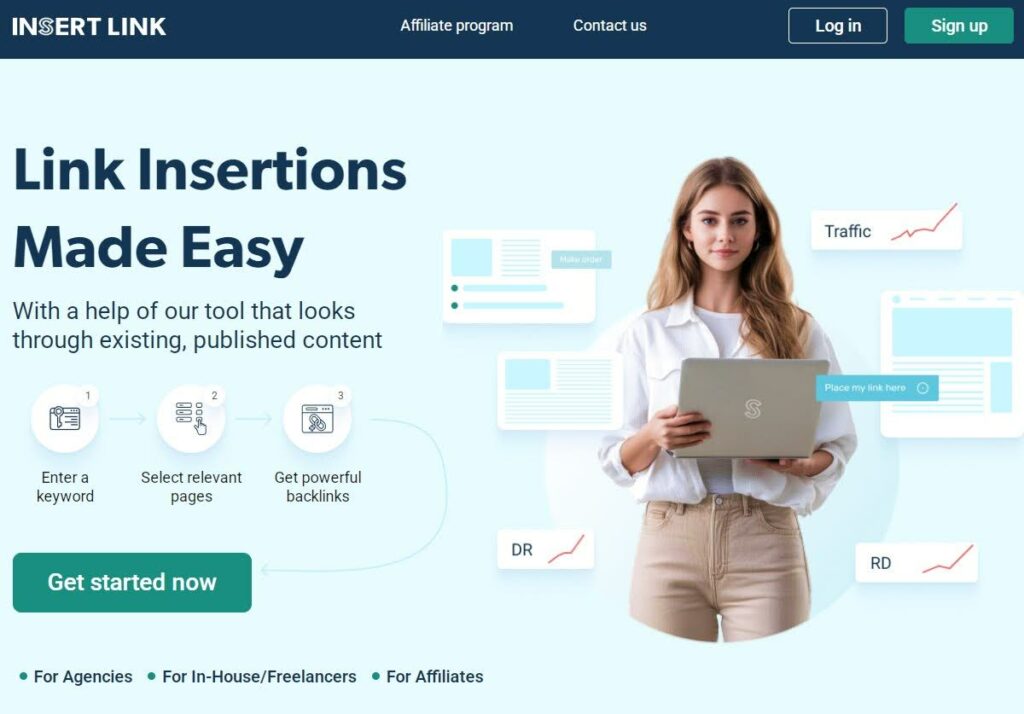
How INSERT.LINK works
Everything runs through a clean, intuitive dashboard that feels more like an store than a typical link-building marketplace.
You can search, filter by niche or region, preview listings, and order in a few clicks.
You log in, enter your keyword or anchor text, and get a list of available pages.

Each result shows traffic, DR, language, and country. Filters help you quickly narrow down the right sites.
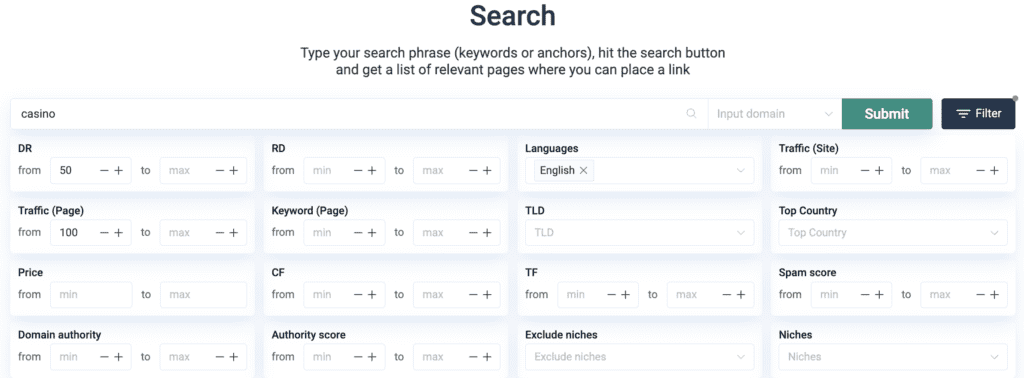
You can filter by anchor text, relevance, traffic, language, and price to see exactly what you're getting.
Most links go live within 1 to 3 days, much faster than traditional outreach.
Prices can be higher for competitive niches like gambling, where link placements typically cost more.

Pricing
Prices start at $10, but casino links usually run higher, often between $150 and $500.
💰 Sign up on INSERT.LINK and use promo code buycasinobacklinks to get $50 credited to your account 🚀
2. Shared.Domains
Shared.Domains lets you get homepage links from real sites in the casino niche, without buying the whole expired domain.

Instead, you share the cost with others and still get a strong homepage link. Simple and effective.
How Shared.Domains work
The platform finds quality dropped domains and splits the cost among several clients, so everyone gets a homepage backlink.
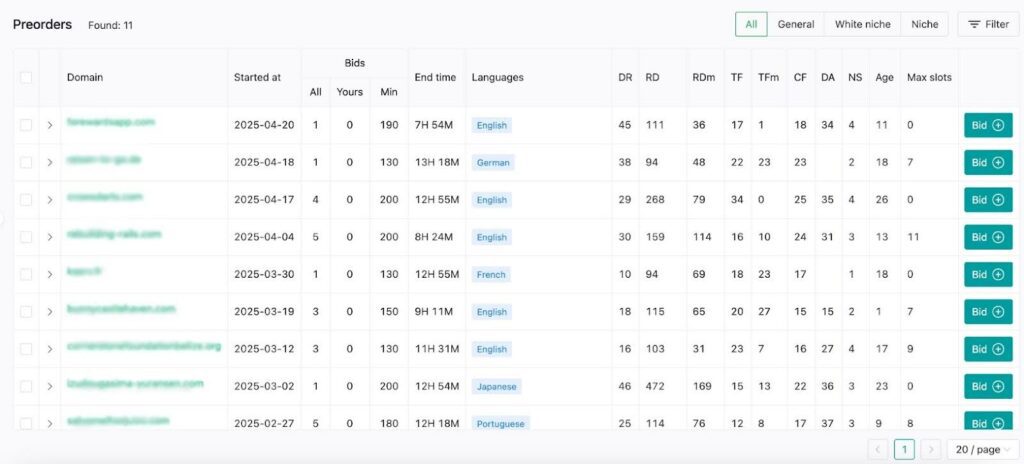
Once enough people join, the domain is purchased, a new site is launched, and your link appears directly on the homepage, not hidden in a footer or blog post.
Pricing
This shared model makes premium domains much more affordable.
A domain worth $8,000 might cost just a few hundred. If 8 people split it, you pay around $1,000 for the first year, including hosting and setup.
Renewals are about $500 per year, divided again, so your share could be as low as $40-70 annually.
You can browse open preorders by DR, niche, traffic, language, and more.

There's also an Aftermarket section where you can pick a ready-made slot and get a live homepage link, often within 24 hours.
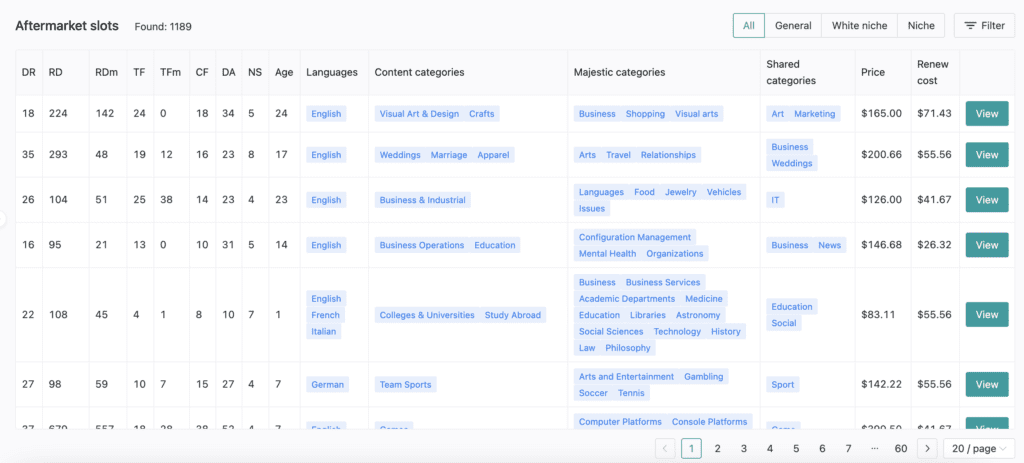
Who can benefit
It's especially valuable in competitive niches like casino, gambling, loans, or crypto, where homepage backlinks are both pricey and hard to secure.
If you're an agency, SEO consultant, or manage sites in competitive niches like gambling, this is a cost-effective way to get real homepage links that are long-term, reliable, and free from shady vendors.
🎁 Join Shared.Domains, use promo code buycasinobacklinks, and get $50 off your first slot 🚀
Casino Link Building FAQs
To finish, let's answer a few popular questions about link-building
Can you build links for an online gambling site organically?
Yes, link-building within the online gambling industry is possible without buying links. For example, some websites in the niche accept guest posts, and you can build quality backlinks from media outlets through PR campaigns.
However, gambling sites are notorious for buying links, so acquiring links organically only may not be enough to successfully compete against them.
How do you evaluate websites for potential link placements?
Here's what you need to pay attention to when assessing potential link-building partners:
✅ Relevance: the page you're targeting needs to be linked to the niche, at least marginally.
✅ Domain Authority: The higher the DA/DR, the more link equity it passes.
✅ Traffic: High organic traffic means high referral traffic to your site. Also, avoid websites with high DR/DA but low traffic because they most likely buy links.
✅ Inbound/Outbound Link Ratio: Anything higher than 4:1 means the site is selling links.
✅ Content quality and website design: If a website has low-quality spun content and is poorly designed, you may be dealing with a link farm.
As you can see, gambling link-building isn't different from other sectors when it comes to prospecting. However, because fewer websites are ready to link to a casino or gambling site, you can't always be picky.
It's a Wrap
Casino link building isn't the easiest search engine optimization game to play. It requires creativity, determination, and a very deep war chest.
You also need to be ready to resort to gray- and black-hat SEO tactics because earning links via legit methods won't be enough to beat the fierce competition that you will face.
But this isn't the main reason why it's so unethical. Gambling ruins people's lives. And that's why Editorial.Link doesn't offer such services.

